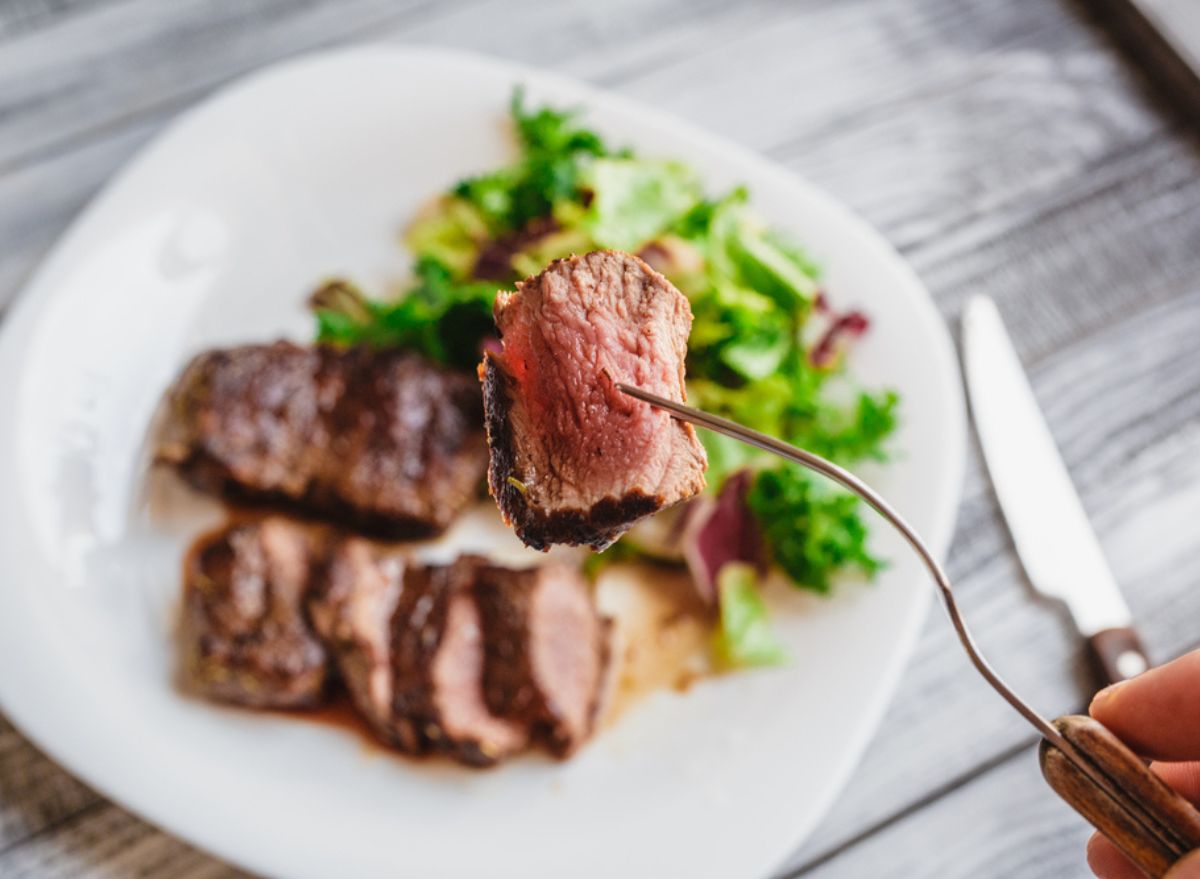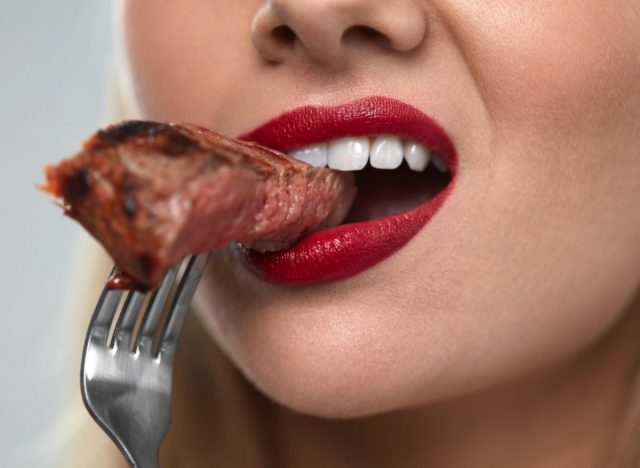4 People Who Should Never Eat Steak, According to Doctors

There’s nothing like a big, juicy steak next to a fluffy pile of mashed potatoes and perfectly seasoned greens. But since red meat has been so maligned, you might wonder if it is good for your overall health. The good news is that—in moderation—lean cuts of steak are good for you, but there are people with certain conditions that should skip it altogether.
When most people eat steak, their “body breaks it down and uses the components for its own purposes, like building muscle and making blood,” explains Dr. Mike Bohl, MD, MPH, ALM, Director of Medical Content and Education at Ro (healthcare technology company) and member of our Medical Expert Board. Unfortunately, that’s not the case for everyone, he goes on to say, “on the not-so-beneficial side of things, steak is high in saturated fat, and regularly consuming red meat has been linked to high cholesterol, heart disease, and cancer—particularly colorectal cancer.”
Read on to find out if you’re one of the 5 people that should never eat steak.
And for more foods you might want to stay away from, take a look at The Worst Bread You Should Never Eat, According to a Dietitian.
Those who have gut-related health problems.

Even though most all foods are fine to consume in moderation (for the most part), steak can affect people who have a sensitive stomach. This is because “gastrointestinal issues make the digestion of red meat more difficult,” Dr. Bohl says.
High amounts of protein and fatty foods, such as steak and red meat, take a much longer time to empty from the stomach. According to Geelong Medical Group, the first sign of having this problem is intense bloating and discomfort, which is a result of excess toxins that gather in the digestive tract.
Anyone with a red meat allergy.

“The only people who should avoid eating steak altogether are those who have a short-term reaction to it, such as those who have an allergy,” explains Dr. Bohl. Sometimes having a steak once in a blue moon won’t do any extraneous harm, but that really isn’t the case if you’re allergic.
Alpha-gal syndrome—only discovered in recent years—is defined as an allergy to products made from mammals, most especially cuts of red meat, Mayo Clinic reports. Although it’s quite rare to have, the allergy is like most, in the sense that it appears within minutes of eating a bite of steak.
Symptoms of the allergy show in the form of hives, itchy and/or scaly skin (eczema), a runny nose, headaches, wheezing or shortness of breath, stomach pain, diarrhea, nausea or vomiting, and swelling in body parts such as the lips, face, tongue and throat.
People that have Diabetes.

Steak and most red meats are much higher saturated fat, she explains, which can accumulate more LDL cholesterol (bad cholesterol) in the blood and spike the body’s blood pressure. “People with diabetes have an increased risk of heart disease, so avoiding steak would prevent a further increase in their risk,” suggests Dr. Cedrina Calder, MD, another member of our expert medical board.
The American Diabetes Associated recommends the intake of total fats for a person with diabetes to not exceed 20 grams and an average 8-ounce steak contains about 19 grams of saturated fat. And considering that the likelihood of having high blood pressure is doubled for a person with diabetes versus someone without, a big steak dinner should be on the menu as little as possible (if at all).
Anyone with a family history of colorectal cancer.

Frequently eating steak can cause a number of health problems, but more so for people who carry certain genetics. Consuming steak and other similar red meats “[have] been associated with several different cancers, especially colon cancer,” Dr. Calder says, “If you have a strong family history of colon cancer, it may be wise to avoid steak.”
There are certain compounds in steak and other red meats, according to researchers at The Cancer Institute, that cause “alkylating” damage and the possible formation of this cancer.
Per Harvard Health, people who eat 5 ounces a day or more of steak (and/or red meat), increase their risk of developing colon cancer by 28%. That being said, lean meats—such as chicken—and fish have been deemed preventative for the disease when consumed long-term.
The best red meat alternatives
Steak is undeniably tasty and if you fall under any of these categories, it can be a hard pill to swallow having to remove or strictly limit it from your diet. What if we told you that you had more options?
“Healthier red meat options include venison, boar, and bison, which contain less saturated fat than beef,” Dr. Bohl explains. And “if you still want to eat beef, the leaner the cut the better. Lean beef cuts include eye of round, top round, bottom round, round tip, sirloin tip side, and top sirloin.”
Having a red meat substitute allows steak lovers to enjoy the protein in a healthy and life-long sustainable way.









